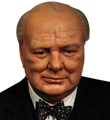Winston Churchill As A Child
|
| updated |
Copy Link Code
|
 From the time he was a young boy, Churchill was rebellious, rambunctious, and extremely independent. As a child, he spent almost no time with his mother – the independent, American daughter of a millionaire – or his father. In fact, when his father died at the age of 45 (on January 24, 1895), Churchill had been long-accustomed to his father's absence, remarking that they hardly ever spoke to one another.
From the time he was a young boy, Churchill was rebellious, rambunctious, and extremely independent. As a child, he spent almost no time with his mother – the independent, American daughter of a millionaire – or his father. In fact, when his father died at the age of 45 (on January 24, 1895), Churchill had been long-accustomed to his father's absence, remarking that they hardly ever spoke to one another.
With such starkly-absent parents, Churchill spent a majority of his time with a governess and a nanny. His governess attempted to teach him the basics of education at the time (reading, writing, and arithmetic) but Winston was stubborn and rebellious, not paying attention and giving her a very hard time. Later, he attended three schools: St. George's School in Ascot, Berkshire; Brunswick School in Hove; and Harrow School. While he was away at school, he wrote countless letters to his mother, begging her to come visit him or to let him come back home. Yet, despite these heartfelt pleas from her oldest son, she rarely visited, and he was not allowed to return home. Perhaps as a result of this parental abandonment, young Churchill had poor academic grades at school, and was frequently punished for them. As a young boy – and well into adulthood, including his political career – Winston also suffered from a pronounced speech impediment, which he struggled with for decades.
During his younger years, Winston Churchill's childhood was spent in Dublin, Ireland. While he lived there, his grandfather served as Viceroy, with his father serving as the Viceroy's private secretary. With such politically-inclined male role models, it's a small wonder that Winston entered into the political arena, himself. Even as a small boy, he was fascinated by the military parades frequently passing by his residence, at the Vice Regal Lodge.
When he first arrived at Harrow School in 1888 – a boarding school close to London – it was only a few weeks before he felt compelled to join the Harrow Rifle Corps. Having watched numerous military parades as a young boy in Dublin, he was drawn to the pomp and circumstance of the orderly troops. Although he enjoyed the drill and ceremony, evidently, Churchill wasn't very skilled at military exams, having to undergo the British Royal Military College exam three times before passing. Luckily, despite his rocky start, he performed very well at the college, graduating 20th in a class of 130.
In Churchill's book, My Early Life, he discusses his distaste for the years he spent cooped up at Harrow, obtaining what he called a 'useless classical education' by way of rote learning, which sapped any possibility of joy and inspiration out of it. Following his time at Harrow, he applied to the Royal Military College, Sandhurst in 1893. Because of his ongoing problem with exams and grades, he applied for cavalry (instead of infantry) because the required grade to pass the exam was lower, and it he wouldn't be required to learn mathematics, one of his least-favorite subjects.
